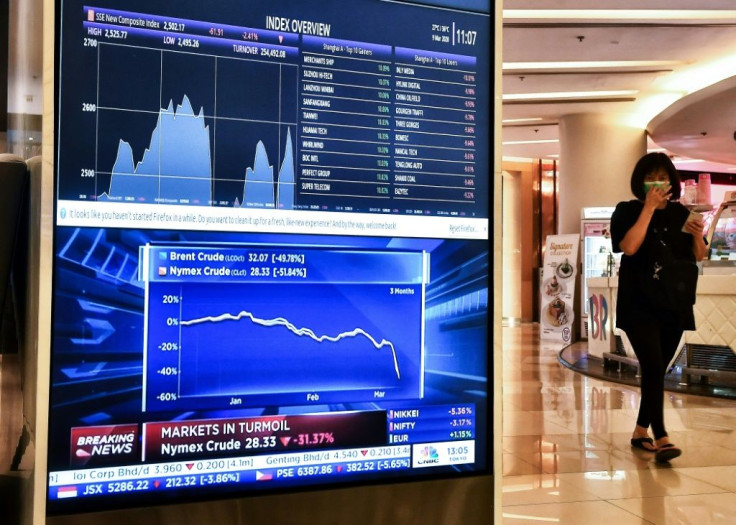Oil Falls Most Since Gulf War As Saudi Starts Price War

Oil prices plunged by almost a third Monday, the biggest drop since the 1991 Gulf War, as top exporter Saudi Arabia launched a price war after Russia blocked a bid to cut output.
In ferocious trading, both main crude contracts nosedived following Riyadh's shock move to slash prices after the alliance between oil-exporting group OPEC and its partners fell apart.
At a meeting last week, Saudi Arabia led a push by OPEC ministers to reduce output to counter the impact of the coronavirus outbreak -- but it hinged on agreement from the group's allies, foremost among them Moscow.
However Russia, the world's second largest oil producer, refused to tighten supply -- and Riyadh then drove through the biggest cuts to prices in 20 years on Sunday, unleashing pandemonium on crude markets.
Saudi equities tanked more than nine percent in response with oil titan Aramco losing 10 percent.
The collapse in prices could have far-reaching consequences, observers warned, from battering revenues in energy-dependent countries, to triggering the cancellation of oil exploration projects and even sparking global deflation.
"A 30 percent plunge in crude oil prices is unprecedented and is sending a huge shockwave across financial markets," said Margaret Yang, an analyst from CMC Markets.
In afternoon Asian trading, West Texas Intermediate was down about 30 percent while Brent crude slipped 26 percent.
The collapse in oil prices added to pressure on equity markets, which were already being hammered by the virus outbreak.
Bourses across Asia fell heavily, with Tokyo closing more than five percent lower and Sydney down over seven percent.
Stock markets in the energy-rich Gulf states nosedived at the start of trading Monday.
Trading was suspended on Kuwait's Premier index after it fell 9.5 percent, while Dubai Financial Market dropped 9.0 percent and Abu Dhabi Securities Exchange shed 7.1 percent.
Energy-linked stocks were among the hardest hit in Asia with Hong Kong-listed CNOOC tumbling 16 percent and PetroChina down 10 percent.
In Singapore, Sembcorp Marine -- which works in the energy exploration sector -- was down over 10 percent.
Saudi Arabia has cut its price for April delivery by $4-6 a barrel to Asia and $7 to the United States, with Aramco selling its Arabian Light at an unprecedented $10.25 a barrel less than Brent to Europe, Bloomberg said.
Jeffrey Halley, senior market analyst at OANDA, said that "Saudi Arabia seems intent on punishing Russia.
"Oil prices... will likely be capped over the next few months as coronavirus stalls economic growth, and Saudi Arabia opens the pumps and offers huge discounts on its crude grades."
Singapore's OCBC Bank said the global economy could be hit by deflation if crude stays around the $30 mark for an extended period, as oil prices play a key role in driving inflation.
This could encourage authorities to loosen monetary policy as they try to stop an uncontrollable deflationary cycle, the bank said.
Yang of CMC Markets said if prices fall to extremely low levels, Russia might ultimately come back to the negotiating table with OPEC and agree on an output cut to shore up markets.
The new developments are reminiscent of the oil price war that erupted in 2014 and sent oil prices crashing to less than $30 a barrel.
The price fall then battered revenues in the Gulf countries, forcing them to resort to austerity measures and borrowing to plug budget deficits.
© Copyright AFP {{Year}}. All rights reserved.





















